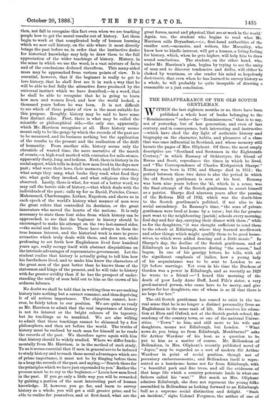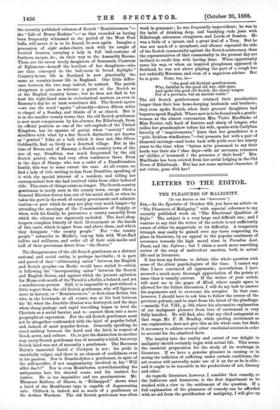THE DISAPPEARANCE OF THE OLD SCOTCH GENTLEMAN.
WITHIN' the last eighteen months or so, there have been published a whole host of books belonging to the " Reminiscences " order—the "Reminiscences," that is to say, not of yesterday, but of last generation, and even of last century, and in consequence, both interesting and instructive —which have shed the dry light of authentic history and biography on the character, habits, and pleasures of a class that was once influential in Scotland, and whose memory Still haunts the pages of Mrs. Oliphant. Of these, the most amply descriptive are "Scotland and Scotsmen in the Eighteenth Century," in which Ramsay of Ochtertyre, the friend ,of Burns and Scott, reproduces the times in which he lived, and "The Correspondence of Charles Kirkpatrick Sharpe." Ramsay was born in 1736, and Sharpe died in 1851; the period between these two dates is also the period in which the old Scotch gentleman is seen at his best. Rameay was born nine years before the '45, which, in a sense, was the final attempt of the Scotch gentleman to assert himself as a patriot. Sharpe died nineteen years after the passing of the Reform Bill of 1832, which was the death-blow to the Scotch gentleman's political, if not also to his social ascendency. In Ramsay's time, "the sons of private gentlemen were bred at home by a tutor; but the far greater part went to the neighbouring [parish] schools every morning, foul day and fair day, carrying their dinner with them ;" while as for the daughters, "it was thought sufficient to send them to the schools at Edinburgh, where they learned needlework and other things which might qualify them to be good house- wives, to which were added dancing and a little music." In Sharpe's day, the decline of the Scotch gentleman, and of Edinburgh as his head-quarters during "the season," had begun. In one of his gossipy letters, he tells, with all the significant emphasis of italics, how a young lady of his acquaintance was to be sent to London to see life before marriage. Yet even in his time the Duchess of Gordon was a power in Edinburgh, and as recently as 1829 he wrote to a friend :—" I heard this morning of the death of poor Lady Anne Duff, Lord Fife's sister, a very good-natured person, who came here to be merry, and give parties for her daughters, one of whom is so ill that there is no hope for her."
The old Scotch gentleman has ceased to exist in the too real sense that he is no longer a distinct personality from an Englishman in the same rank of life. He receives his educa- tion at Eton and Oxford, not at the Scotch parish school, the academy of the country town, or one of the national Univer- sities. " Town " to him, and still more to his wife and daughters, means not Edinburgh, but London. "What news do you bring us from Edinburgh, Monkbarns ?" aolks Sir Arthur Wardottr of his host, as a question to be put to him as a matter of course. Mr. Bellendean of Bellendean, in Mrs. Oliphant's recently published novel of "Joyce," may be regarded as a sort of modern Sir Arthur Wardour in point of social position, though not .of pecuniary embarrassments ; and Bellendean itself is repre- sented as a handsome house not far from Edinburgh, with "a beautiful park and fine trees, and all the evidences . of that large life which a country potentate leads in what our fathers called his seat." But much as Mrs. Oliphant admires Edinburgh, she does not represent the young folks assembled in Bellendea.n as looking forward to an Edinburgh ball as a supreme social distinction and delight. "Such an incident," sighs Colonel Ferguson, the author of one of
the recently published volumes of Scotch "Reminiscences "- the "Life of Henry Erskine "--" as that recorded as having been frequently witnessed at the period of the West Port balls, will never, it is to be feared, be see,n again. Imagine a
• procession of eight sedan-chairs, each with its couple of liveried bearers, carrying a lady in full ball-costume of
feathers, sacque, &c., on their way to the Assembly Rooms.
• These are the seven lovely daughters of Susannah, Countess of Eglintoun—herself the loveliest of her daughters—who - are thus conveyed to the ball-room in broad daylight." Country-house life in Scotland is now practically the same as country-house life in England. One little differ- ence between the two may, indeed, be noticed. The parish clergyman is quite as welcome a guest at the Scotch as at the English country house ; but he does not find in his host his right-hand man in ecclesiastical matters, as even in Ramsay's day he at least sometimes did. The Scotch squire —we use the word " squire " advisedly—drives fifteen miles to chapel of a Sunday, and thinks of it as church. But it is in the smaller county towns that the old Scotch gentleman is now most conspicuous by his absence, for Edinburgh, from its official position as one of the sub-capitals of the United Kingdom, has its spasms of gaiety, when " society " rubs shoulders with what by a fine Scotch distinction are known as " genteel " folks at a ball, which it does not, like Oliver Goldsmith, find as lively as a deserted village. But in the time of Burns and of Ramsay, a Scotch country town of the
• size of, say, Dumfries, was much frequented by the old Scotch gentry, who had very often residences there. Even in the days of Sharpe, who was a cadet of a Dumfriesshire family, this was to some extent the case. At all events, we find a lady of title writing to him from Dumfries, speaking of it with the special interest of a resident, and telling her correspondent how she had received visits from other ladies of title. This state of things exists no longer. The Scotch country gentleman is rarely seen in the county town, except when a General Election forces him out of his social shell, or when he takes his part in the work of county government and adminis- tration—a part which he may not play very much longer—by attending the meetings of the Commissioners of Supply, or when, with his family, he patronises a county assembly from which the citizens are rigorously excluded. The local shop- keepers complain bitterly of their ill-treatment at the hands of this caste, which is apart from and above them, and which
• they designate "the county people." For "the county people" subscribe to Mudie's, run-up bills with West-End tailors and milliners, and order all of their nick-nacks and half of their provisions direct from "the Stores."
The disappearance of the old Scotch gentleman as a distinct national and social entity, is perhaps inevitable ; it is part and parcel of that "obliterating union" between the English and Scotch peoples—as Burke would have styled it—which is following the "incorporating union" between the Scotch and English States, and against which the present agitation for Home-rule north of the Tweed is a feeble, a belated, and yet a mischievous protest. Still, it is impossible to part without a little regret from the old Scotch gentleman, who will figure no more in history, or "Reminiscences," or first-class fiction, but who, in the Lowlands at all events, was at his beat between the '45, when the Jacobite illusion was destroyed, and the days when cheap postage and rapid travelling began to level the Cheviots as a social barrier, and to convert them into a mere geographical expression. For the old Scotch gentleman must not be altogether confounded with the laird of popular belief, and, indeed, of most popular fiction. Generally speaking, he stood midway between the Lord and the laird, in respect of blood, acres, and culture. Or, to put the distinction in another way, every Scotch gentleman was of necessity a laird, but every Scotch laird was not of necessity a gentleman. The Baroness Nairn's immortal Laird o' Cockpen is not ; his pride is essentially vulgar, and there is an element of sordidness even in his passion. Nor is Dumbiedykes a gentleman, in spite of the self-sacrifice, if not magna,nimity, involved in his "Will suer dae't ?" Nor is even Monkbarns, notwithstanding his antiquarian lore, his shrewd sense, and his instinct for justice. He is too inquisitive and too parsimonious. Mr. Ebenezer Balfour, of Shaws, in "Kidnapped," shows what a laird of the Monkbarns type is capable of degenerating into. Oldbuck is, indeed, not so much of a gentleman as Sir Arthur Wardour. The old Scotch gentleman was often
weak in grammar ; he was frequently improvident ; he was in the habit of drinking deep, and bandying rude jests with Edinburgh advocates, clergymen, and Lords of Session. He was a little of a tyrant, and a great deal of a Tory. But he was not much of a sycophant, and oftener espoused the side of the Scotch commonalty against the Scotch aristocracy, than the representatives of that commonalty in the present day are
inclined to credit him with having done. When opportunity came his way, or when an inspired ploughman appeared in Scotland, he was not above playing the part of a rough but not unkindly Mtecenas, and even of a sagacious adviser. But he is gone. Gone, too, is—
"the good old Scottish gentlewoman, Who, faithful to the good old way, still span, And spoke the good old Scotch, the classic tongue Not of a province, but an ancient realm."
The old Scotch gentlewomen retained their peculiarities longer than their less home-keeping husbands and brothers ; they even spoke Scotch, when their grocers' daughters had begun to speak English. Where now is to be found such a gentle- woman as the almost centenarian Mrs. Violet MacShake of Miss Ferrier, tall, hard of feature, and sharp of tongue, who rallies her grandnephew before his wife, speaks with Carlylian ferocity of "improvements," hints that her grandniece is a " puir, feckless windlestrae "—but presents her with a pair of diamond earrings—and looks back with pride over her ninety years to the time when "balms neer presumed to say their heeds war their sin thae days—wife an' servants, reteeners an' childer, a' trummelt i' the presence o' their heed." Mrs.
MacShake has been evicted from her aerial lodging in the Old Town of Edinburgh. But has not some national character, if not virtue, gone with her ?



































 Previous page
Previous page